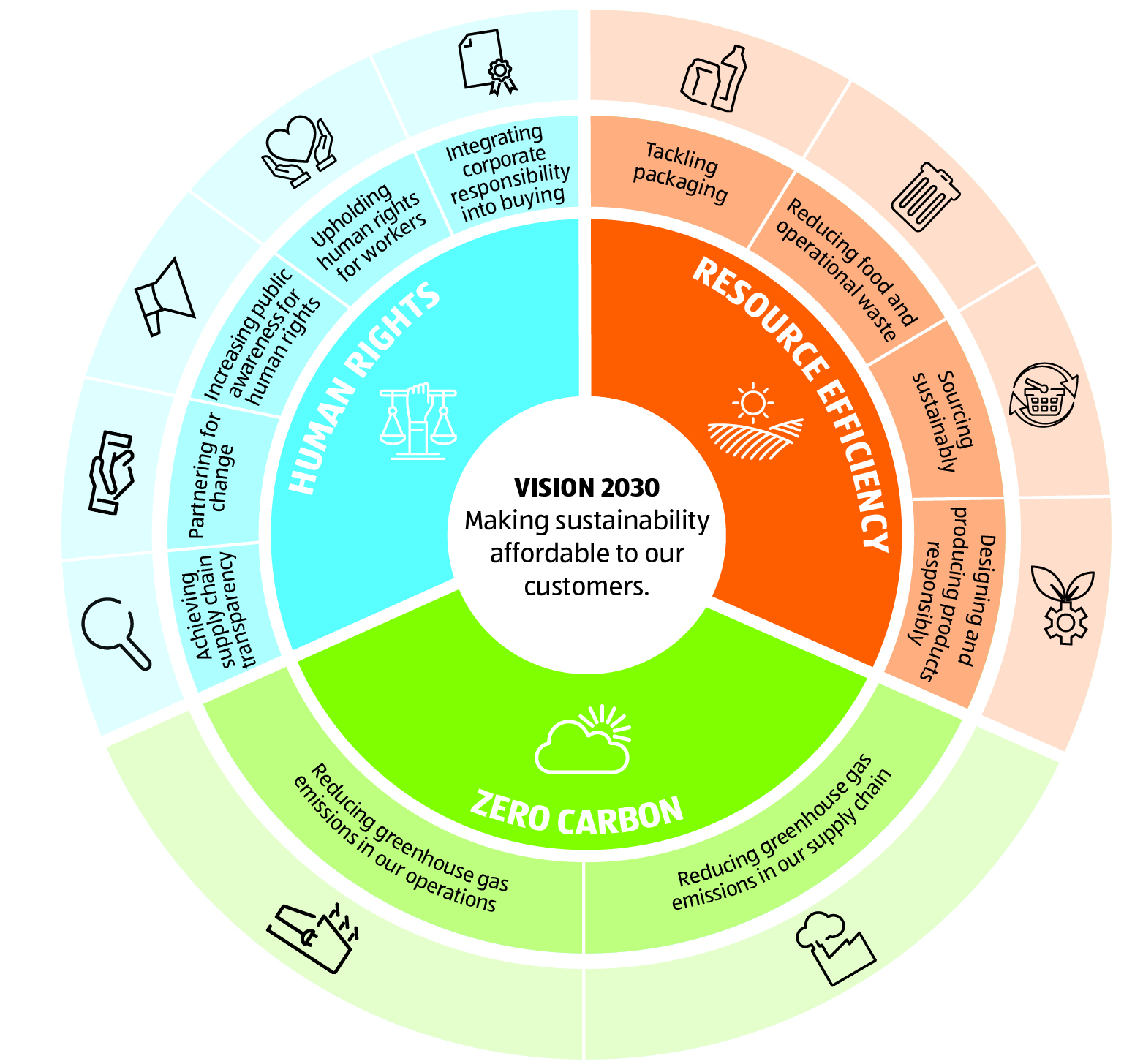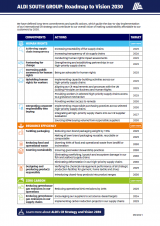Roadmap to Vision 2030
Development
We carefully considered different sources and perspectives when developing our international CR strategy and Vision 2030. Our global focus areas and strategic goals were identified through detailed environmental and human rights risk assessments in our food and non-food supply chains. An international stakeholder survey with around 6,000 participants helped us to identify key priorities of customers, suppliers, and employees in all our markets. Besides considering perspectives of external stakeholders such as NGOs, civil society, etc., all national Corporate Responsibility Departments of ALDI were involved in the development of our international CR strategy in order to integrate and reflect the national market perspective.
Review
By reviewing our strategic approach every three years, we can ensure that our strategic priorities continue to focus on areas, which are most material to our business and where we can have the greatest impact on society and the environment. For the review of our international CR strategy, we will be taking into account all relevant internal and external developments. A series of risk and impact assessments, covering both social and environmental issues, will support us in identifying and addressing material topics in our supply chains. We are committed to transparently communicate the outcome of our regular strategy review.
We believe that collaboration is key to achieve sustainable development and greatest change can only happen by working with all affected parties. Working with external partners and engaging in multi-stakeholder initiatives broadens our horizon and supports us to integrate different perspectives in our international CR strategy. We engage with our stakeholders to achieve common goals and seek to build greater awareness on current and future challenges along our supply chains and throughout our company.
Reporting
By measuring our strategic performance on a regular basis, we are continuously validating the effectiveness of our actions and highlight the areas where we are already making strong progress as well as other areas where further action is still required. We will report on the changes to our internal and external processes and their root causes. This will create a long-lasting positive impact - the key purpose of our International CR Strategy.
In March 2021, we announced our new International CR Strategy and we will report progress towards its implementation from 2022. The reporting will be based on our below outlined commitments and actions and will provide our stakeholders the opportunity to track our progress towards our long-term actions on an annual basis.
High-priority supply chains
More sustainable agricultural practices and the responsible use of resources help to respect human rights, protect the environment and ensure the long-term availability of resources in the future. As a global retailer, we want to use our global buying power and market influence to create lasting change for a better future. We will focus our activities on high-priority raw materials and commodity groups.
Human Rights
Achieving supply chain transparency
Supply chain transparency is the foundation for all our sustainability measures. As every supply chain is different, ALDI has the challenge to understand where our products started their journey. We are aware that without this knowledge, we cannot ensure compliance with our requirements, analyse risks, monitor or implement projects. We will make our high-priority supply chains transparent, so that we have a better understanding about the products we sell.
| Actions | Target | |
|---|---|---|
| Increasing traceability |
|
2025 |
| Increasing transparency |
Progress so far:
|
2026 |
| Conducting human rights impact assessments (HRIA) |
|
2025 |
Partnering for change
We will support long-term partnerships and impact-led collaborations to improve the livelihoods and working conditions for producers’ rights along our high-priority supply chains.
| Action | Target | |
|---|---|---|
| Engaging in partnerships | We will strengthen existing partnerships and establish new partnerships in our high-priority supply chains. Our impact led approach will address critical human rights and environmental issues. | 2025 |
Increasing public awareness for human rights
We will increase public awareness for the importance of human rights by being transparent about challenges and using our voice to advocate for change.
| Action | Target | |
|---|---|---|
| Being an advocate for human rights |
|
2025 |
Upholding human rights for workers
We will work to ensure that the human rights of workers that contribute to our priority supply chains are respected and we strive towards improving their human rights if any issues are found.
| Actions | Target | |
|---|---|---|
| Implementing capacity-building activities |
|
2025 |
| Aligning our CR requirements and processes with the UNGP |
|
2025 |
| Providing workers access to a grievance mechanism |
|
2025 |
| Providing workers access to remedy |
|
2030 |
Integrating corporate responsibility into buying
We will use our buying power to respect and support human rights by making our buying practices more sustainable.
| Actions | Target | |
|---|---|---|
| Implementing responsible purchasing practices |
|
2030 |
| Integrating all high-priority supply chains into our CRSE |
|
2027 |
| Sourcing 80% of buying volume from responsible suppliers |
|
2030 |
Resource Efficiency
Tackling packaging
We will reduce our own brand product packaging weight and make the packaging we do use 100% reusable, recyclable or compostable.
| Actions | Target | |
|---|---|---|
| Reducing own brand packaging weight |
|
2025 |
| Making all own brand packaging reusable, recyclable or compostable |
|
2025 |
Reducing food and operational waste
We will reduce food waste across our business and make other operational waste reusable or recyclable.
| Action | Target | |
|---|---|---|
| Reducing food and operational waste |
|
2030 |
Sourcing sustainably
We will act to uphold human rights and protect ecosystems by focusing on sustainable sourcing, good water stewardship and deforestation-free supply chains across our priorities.
| Actions | Target | |
|---|---|---|
| Increasing the number of sustainable products available to our customers |
Progress so far:
|
2025 |
| Ensuring good water stewardship practices |
|
2030 |
| Eliminating overfishing, bycatch and ecosystem damage in our fish and seafood supply chains |
|
2030 |
| Eliminating deforestation in our high-priority supply chains |
|
2030 |
Designing and producing products responsibly
We will ensure in close cooperation with our business partners that products are designed and produced in an environmentally responsible way.
| Actions | Target | |
|---|---|---|
| Verifying the chemical management performance of all strategic production facilities for garment, home textile and shoes |
|
2025 |
| Introducing closed-loop products into our product ranges |
|
2030 |
Zero Carbon
Reducing greenhouse gas emissions in our operations
We will reduce the operational greenhouse gas emissions of our business to achieve our vision of zero carbon.
| Action | Target | |
|---|---|---|
| Reducing our operational GHG emissions |
|
2025 |
Reducing greenhouse gas emissions in our supply chain
As part of our wider commitment to minimise the impact of our products, we will also work with our business partners to cut their greenhouse gas emissions and promote climate protection projects in our supply chains.
| Actions | Target | |
|---|---|---|
| Encouraging our suppliers to set science-based targets |
|
2024 |
| Implementing carbon reduction projects in selected supply chains |
|
2025 |


